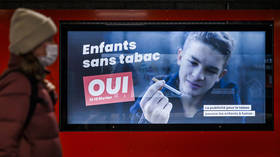Voters pass near-total ban on tobacco ads

Citizens of Switzerland approved an initiative to tighten their famously lenient tobacco laws by banning virtually all advertising of the products. The campaign, which was opposed by the government and parliament, was backed by nearly 57% of voters and a majority of the country’s 26 cantons on Sunday.
At present, most tobacco advertising is legal at the national level – with the exception of TV and radio ads, as well as those that are directly aimed at minors. However, regulations vary between regions when it comes to public spaces, festivals, venues, and public transport. The majority of cantons permit ads in print news or on the internet.
According to the initiative, only advertising directly targeting adults can be permitted, such as those in magazines, targeted emails, and web content geared toward adults. The federal government now has to draft legislation to revise the country’s Tobacco Products Law. Health Minister Alain Berset told media in Bern that it would be “impossible” to bring the changes into force this year.
The victory marked a “big step forward” in the fight against tobacco in Switzerland, Gregoire Vittoz, director of the Addiction Switzerland NGO, told Swiss TV network RTS. He said voters had sent a “clear message” to parliament about their desire to “protect children.”
Around one in four people in Switzerland is a smoker, according to official public health figures. The statistics are slightly elevated among those aged 15-24, with nearly one in three people smoking in that age group. There are around 9,500 tobacco-related deaths annually.
The lax advertising laws are widely attributed to intense lobbying by the world’s largest tobacco firms, including Philip Morris International (PMI), British American Tobacco, and Japan Tobacco. An unnamed PMI spokesperson told the AFP that the initiative represented a “slippery slope as far as individual freedom is concerned.”
Those concerns were echoed by lawmakers who opposed the initiative, arguing that it went too far. Criticizing the “dictatorship of the politically correct” for wanting to regulate “everything,” Philippe Bauer, a politician from the right-wing Liberal Party, told RTS that the win would lead to similar measures against alcohol and meat.
The initiative’s critics had proposed a less “radical” alternative that, they claimed, would have struck a balance between protecting children while addressing economic concerns. However, Berset admitted that the “counter-proposal was not seen as sufficient.”













